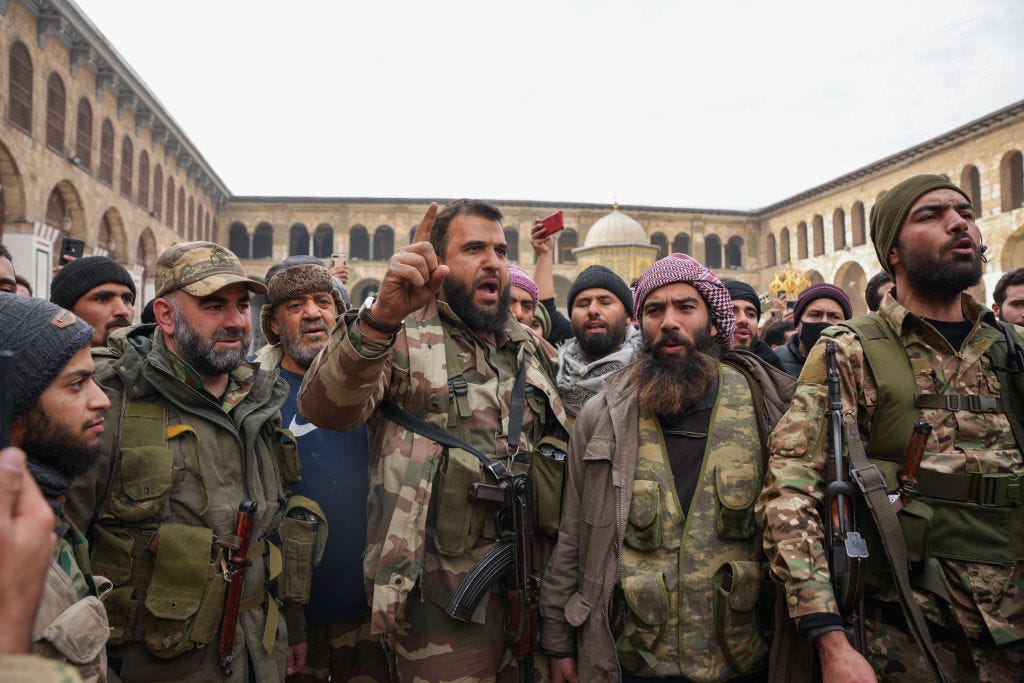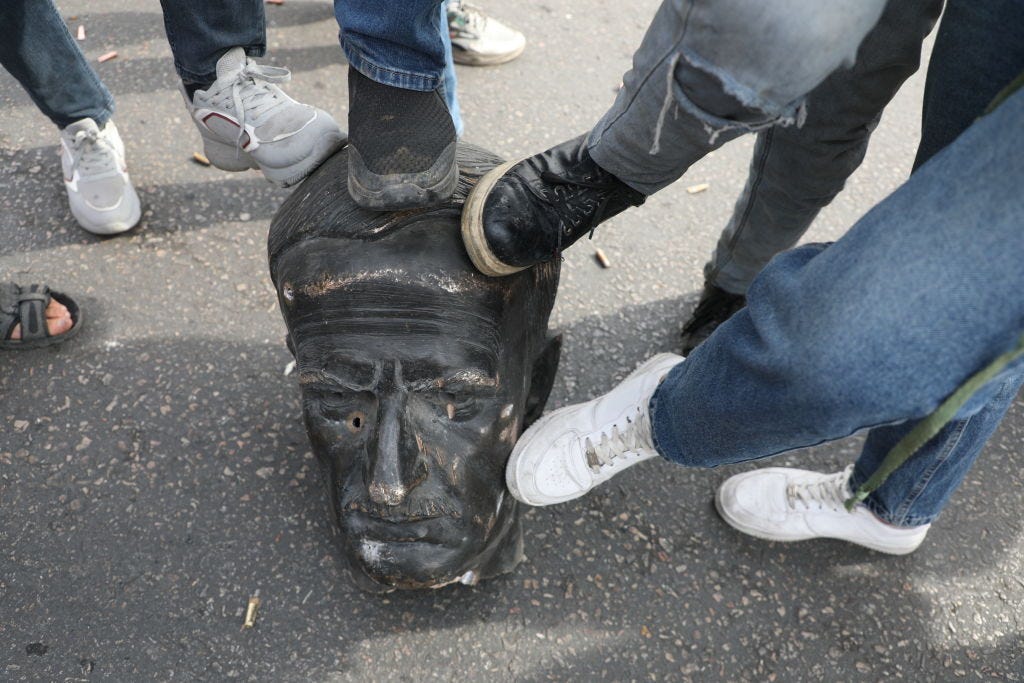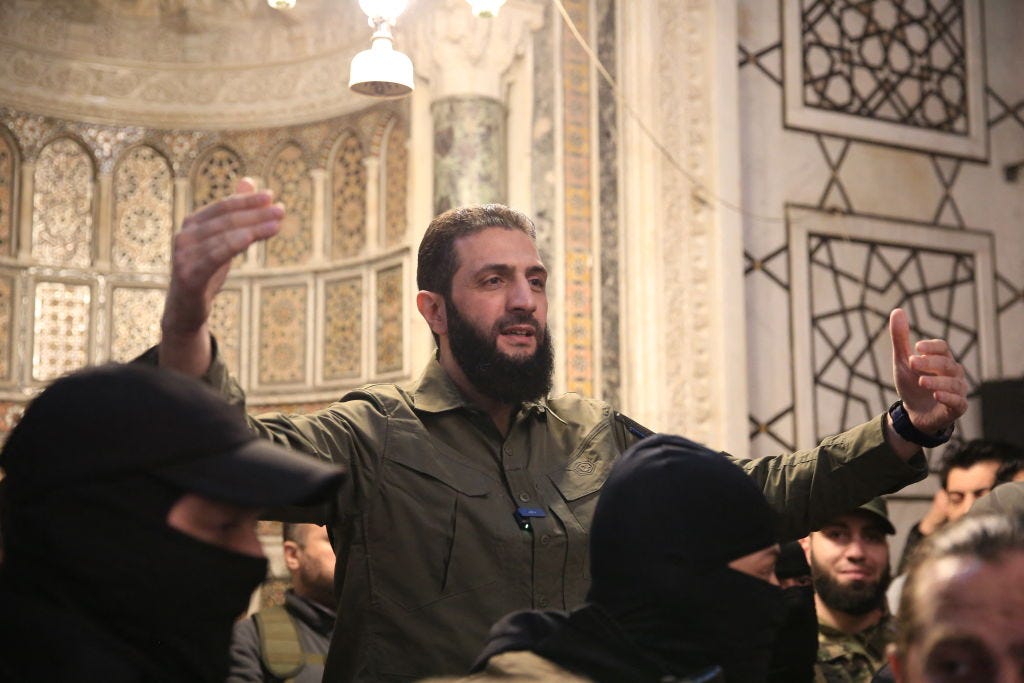Hayat Tahrir al-Sham, a United States-designated political organization that was formerly linked to al-Qaeda, in the past week stunned the world — and Syrians themselves — by seizing strategic areas of the country’s historic business hub of Aleppo and central Hama, before moving on to the gates of Damascus early Sunday, prompting Syrian tyrant Bashar Al-Assad to flee to an unknown destination and bringing an end to the family’s 50-year rule.
What is the reaction inside?
“I am rejoicing. Everyone is happy. We are full of tears,” one 30-something professional, Malak, who resides in Damascus tells The New York Sun via encrypted messenger early Sunday. “We are free. It is a day for history.”
Malak points to the persistent fear of living under a dictatorship responsible for the deaths of more than half a million Syrians.
Another young professional in the port city and Alawite stronghold of Latakia also conveyed jubilation to the Sun on messenger at the news.
“It is done. No more Assad,” Ayman Abdel Nour, a Christian Syrian reformist and defected Assad government adviser, tells the Sun. “Some are happy. Some worry.”
He predicts that Hayat Tahrir al-Sham will ask current government employees to stay in their positions and in around one month, United Nations Special Envoy to Syria, Geir Pedersen, will come to Damascus to help oversee a transitional governance.
“They will invite everybody to the negotiation table, and they will form a new Syria with a new future,” Mr. Nour continued. “How it will be done, I think, will be a country broken into five or six states. Each has its own municipality regulation, rather than a central governance.”
Another source based in Idlib tells the Sun on messenger that the prisons were opened early Sunday following the collapse, and that he was able to connect with a friend jailed in Damascus since 2009.
“There are celebrations across the country. No more airstrikes, no more displaced, no more bullying on the people who were opposed to the regime,” he said.
A source in the Kurdish areas of the country expressed relief to the Sun on a call that Mr. Assad had left and that the war may finally be over, but emphasized the future of the country, and its control, is “unknown.”
“As Kurdish we have now only the issue of forces supported by Turkish attacking our areas, the source said, referring to the regions controlled by the United States-backed Syrian Democratic Forces.
Many Syrians are indeed still trying to wrap their heads around the dizzying speed at which the tables turned this week.
“Everyone is still in shock over the complete liberation of Aleppo city, especially since it happened within just one day,” Mustafa Hafez, a 32-year-old media activist based in Aleppo, also tells the Sun via encrypted messenger. “Although everyone was aware of the fragile state of the Syrian government’s forces, no one expected the regime to collapse so quickly. The liberation of Aleppo from the Syrian regime brought us immense joy. I was considering leaving Syria, but now, with Aleppo freed, I no longer have a reason to leave.”
Mr. Hafez is one of several people inside Hayat Tahrir al-Sham areas in Syria who connected with the Sun in the days after the armed opposition group seized strategic swaths of the country from forces loyal to Mr. Assad. Most depicted support for the governance change and claimed they have been treated well and can move freely but spoke on the condition of anonymity due to fears over retaliation or the safety of relatives in other parts of the country.
Aleppo, seized by rebels early in the Syrian civil war, was reclaimed by Syrian government forces with Russian support in 2016 after a devastating siege. While the city has for the most part since then avoided warfare and even though the Assad dictatorship routinely touts its reconstruction efforts, human rights groups and outside observers point to ongoing human rights abuses, including torture, civilian killings, and a lack of democratic freedoms.
Air strikes by the now crumbled Syrian government and its allied Russian forces have killed hundreds in recent days and sent thousands fleeing, igniting concerns that intense fighting from a decade ago could re-ignite.
“We are happy, but we do not want to leave our house,” a mother of four in Aleppo tells the Sun. “Even our houses are not safe. And it could get much worse.”
Bill Roggio, senior fellow of the Foundation for Defense of Democracies, tells the Sun that the offensive didn’t come out of nowhere. He reckons that the anti- Al-Assad group “has spent the last several years professionalizing its forces and accumulating weapons and ammunition to prepare for its offensive.”
“The Syrian Arab Army appears to have become complacent after years of minimal fighting and was not prepared for the Hayat Tahrir al-Sham offensive,” he explained. “Assad will likely need the support of Russia, Iran, and the Iranian-backed Iraq militias to stem the tide.”
But that came all but too late.
How it Happened
Mr. Hafez tells the Sun that Hayat Tahrir al-Sham has “medium and heavy arms” and even sent in its Shahin Unit, which specializes in the use of “combat drones, which shifted the balance in favor of the (HTS) factions,” but analysts and those on the ground note that the takeovers happened swiftly with little exchange of fire.
“There were no clashes or direct war or bumping between the two. The Syrian regime forces don’t have any motivation, all are the people who have obligatory military service, which means they don’t have any training. They don’t ammunition. They don’t have any food. All the food for them is stolen by their officers and sold for their own pocket or by Assad nonprofit organizations,” Mr. Nour said. “The groups that entered were highly trained, highly equipped. They have drones. They have good preparation.”
Mr. Nour claimed that the withdrawing Syrian army left a number of tanks that are now in militant hands and that Hayat Tahrir al-Sham was focused solely on Aleppo. Moving on to Hama, and then Damascus, was merely taking advantage of the opportunity after their triumph.
The Rebel Group Behind the Takeover
Who exactly is Hayat Tahrir al-Sham? The group was formed in 2011 as Jabhat al-Nusra, an affiliate of al-Qaeda. In 2017, it publicly distanced itself from the group, claiming to have moderated its ideology. However, human rights organizations accuse Hayat Tahrir al-Sham of detaining and mistreating journalists and civilians who oppose them, allegations that the group denies. Since the Aleppo takeover, the group has pledged to protect Syrians of all sects.
Minorities in Syria, including Christians — who have long suffered under the thumb of jihadist outfits — were initially apprehensive of the insurgency — but the group’s leader, Abu Mohammed al-Golani, has repeatedly vowed in statements to assure the protection of all citizens, irrespective of sect or affiliation.
So far in these areas, Mr. Nour says, Hayat Tahrir al-Sham “have not forced Christian women to wear hijabs, and they have not destroyed Christmas ornaments or looted or destroyed any building.” Mr. Nour said. “They have a clear message – to protect all,” he says.
Others warn that such proclamations may not hold.
Hayat Tahrir al-Sham is “ideologically extreme. They tactically distanced themselves from al-Qaeda during the counter-ISIS coalition’s peak to avoid being targeted,” the senior director of the Counter Extremism Project, Hans-Jakob Schindler, tells The New York Sun. “But make no mistake — they’re not trustworthy.”
From Mr. Schindler’s point of view, it boils down to a choice between the devil one does or doesn’t know.
“Assad is horrific, but he’s a dictator focused on his country,” Mr. Schindler says. He contrasts that with Hayat Tahrir al-Sham, which while claiming to be focused on Syria, still has “tolerance for extremist groups within their territory, and that makes them a long-term risk.” He notes that the United States and the West have significantly reduced their presence and have little influence in the region. “The real players now are Turkey, Russia, Iran, and Assad, none of whom are ideal partners.”
With Mr. Assad no longer on the ground, it is unclear how Iran and Russia will respond.
Bill Roggio asserted that “it is never a good idea to give terrorists a safe haven to operate from.”
“There are major concerns that Syrian chemical weapons stockpiles can fall into the hands of jihadist groups,” he said. “There are no good actors in this war.”
Mr. Roggio also pointed out that there are “major concerns that Syrian chemical weapons stockpiles can fall into the hands of jihadist groups.”
Mr. Hafez surmised that he, and most other civilians in the city, view the expulsion of Mr. Assad troops as a “revolution, not a civil war” and while he understands the international community’s “fears about what might happen if Hayat Tahrir al-Sham gains control over Syria,” he believes “Hayat Tahrir al-Sham has learned from past lessons and has changed its policies, as we see on the ground, especially in how it deals with civilians and other sects.”
Ronnie Hamada, a conflict analyst and risk management who fled his hometown of Aleppo at the height of the war, tells the Sun via messenger that everyone left there is “exhausted” and underscored that “this is a population that had the misfortune of staying.”
“Everyone who could leave has already left the country, and those who stayed are in shambles,” he pointed out. “Of course, there are those who are super happy about the ‘liberation’ of Aleppo and Hama and are now able to return to their homes after years in camps, but I also understand the concern of those who are worried about what’s coming.”
He said early Saturday many were predicting the regime to fall within a matter of days as there seemed to be little pushback by Syrian forces.
Over the past few days, the embattled regime rushed to deploy reinforcements to the lost territories and offered dramatic salary increases for those willing to fight. At the same time, its Moscow allies have carried out a series of punishing airstrikes on critical infrastructure, schools, and health facilities in and around Idlib, the long-standing Hayat Tahrir al-Sham and opposition stronghold where the surprise offensive is believed to have originated. But it seems it wasn’t enough.
The Geopolitical Quagmire
The timing of Hayat Tahrir al-Sham’s rise to power is also critical and highlights the complexity of the regional geopolitics at play.
“Hezbollah was by far the main contributor to bringing the city back to Assad’s control back in late 2016. Since then, Hezbollah has had a significant presence in the city and its surroundings; it asserted de facto control over the city,” Mr. Hamada explains. “Israel’s killing of the first two command rows of Hezbollah over the past few months, coupled with the Israel Defense Force’s invasion into Lebanese territory, has led to Hezbollah troop redeployments from Aleppo and its countryside to Southern Lebanon.”
Retired lieutenant colonel in the United States Army Special Forces, Jason Amerine, tells the Sun that Mr. Assad’s downfall was, in one word, “Ukraine.”
“This is why you destroy Russia in Ukraine,” he said. “Ukraine did this. Israel to a lesser degree.”
Ankara insisted opposition forces be included in normalization talks, Mr. Assad, however, demanded the withdrawal of Turkish forces from northern Syria as a condition for normalization. Damascus labels the insurgents as terrorists and long vowed a harsh response, neighboring Arab countries, once opposed to Mr. Assad, in recent months had grown to back him due to regional concerns.
Iran, meanwhile, spent the last week urgently scrambling to mobilize regional forces to support Mr. Assad, dispatching fighters from the largely weakened Hezbollah and Iraq’s Shiite militias to Syria.
“The untapped potential is the Iraqi militias, which have fought in Syria in the past,” Mr. Roggio said. “I expect Iran’s Islamic Revolutionary Guards Corps personnel to pair up with the Iraqi militias to bolster the failing Syrian military.”
However, a former Speaker of the Iraqi parliament and founder of the prominent Sunni Progress Party, Mohamed al-Halbousi, told the Sun on a visit to Washington D.C. on Friday that Baghdad does not support any form of interference in Syria, acknowledging that while the government cannot control the Shiite militia groups it can “control its border” and prohibit fighters from crossing into the neighboring country.
For Washington and Israel, “whom to support” is equally problematic, as a victory for either side poses risks. President Al-Assad’s alliance with Iran, Israel’s enemy, could strengthen if he prevails, undermining Israel’s efforts to weaken Iran’s influence in the region. On the other hand, Hayat Tahrir al-Sham is a designated terrorist organization that Israel sees as a threat.
Some 900 United States troops stationed in Syria to support the Kurdish Syrian Democratic Forces battling the Islamic State remnants now face the unknown. On Tuesday, United States forces in Syria conducted a “self-defensive” strike after multiple rocket launchers targeted the their vicinity.
Syria’s Future
The escalation in fighting and the swift collapse of regime forces in key areas calls into question what this all means for Syria’s leadership.
“Replacing (Assad) isn’t straightforward; it’s a deeply entrenched system,” surmised Mr. Schindler.
Mr. al-Halbousi stressed that Iraq “absolutely does not want radical neighbors” but recognizes that turmoil will only continue without legitimate elections.
“The Syrian people must have real representation, including everyone in Syria, through a democratic process,” he continued. “On the other hand, if groups like Jabhat al-Nusra or Hayat Tahrir al-Sham take full control of Syria, that won’t lead to stability either.”
For many, having a terrorist group in the Palace is far from ideal— but still better than the deeply-entrenched tyrant.
One political operative explained that he had to flee Aleppo for Turkey six months ago to escape persecution by Hayat Tahrir al-Sham who “targeted him” for his affiliation with the Syrian Interim Government, a body aligned with opposition groups resisting the group’s rule.
“Hayat Tahrir al-Sham is not good,” the operative, who asked not to be identified by name, wrote to the Sun via encrypted messenger. “But no one is worse than the Assad regime.”
https://www.nysun.com/article/the-sentiment-inside-the-newly-taken-syria-includes-an-element-of-surprise













